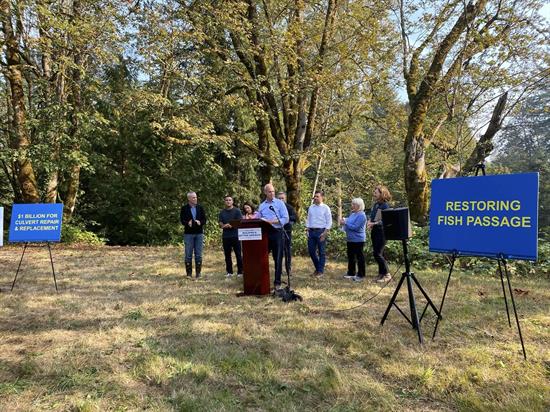Press Releases
Larsen: Three Years In, The Bipartisan Infrastructure Law is Delivering for Northwest Washington CommunitiesTogether, BIL and Inflation Reduction Act have invested more than $386 million in WA-02 transportation projects
Washington, D.C.,
November 15, 2024
“Thanks to the Bipartisan Infrastructure Law, every day is infrastructure day in Northwest Washington,” said Larsen, the top Democrat on the Transportation & Infrastructure Committee.
WASHINGTON, D.C. – Today, Rep. Rick Larsen (WA-02) released the below statement on the three-year anniversary of the signing of the Bipartisan Infrastructure Law. Since 2021, the BIL and the Inflation Reduction Act have invested more than $386 million into infrastructure projects that benefit WA-02 communities. “Thanks to the Bipartisan Infrastructure Law, every day is infrastructure day in Northwest Washington,” said Larsen, the top Democrat on the Transportation & Infrastructure Committee. “Three years in, the BIL is delivering critical investments for local communities to create jobs and build a cleaner, greener, safer and more accessible transportation system. From the Lynnwood Link extension and new EV charging infrastructure at the Mount Vernon Library Commons to cleaner buses and ferries and safer roads, highways and bridges for all road users, the BIL is investing in the infrastructure Northwest Washington communities need to compete and thrive into the 2050s and beyond. “I will continue working with state, local and Tribal leaders and stakeholders to build on these investments to create more jobs and keep people and the economy moving.” Every Day is Infrastructure Day in Northwest Washington Since the BIL became law, more than $386 million has been invested in transportation projects that benefit WA-02 communities. These projects include: Fixing Roads, Bridges and Other Critical Infrastructure · $25 million for the City of Lynnwood to construct a new six-lane, multimodal bridge over I-5 in Lynnwood. · $25 million for Whatcom County to replace the 60-year-old Lummi Island ferry with an electric-battery hybrid ferry and build related infrastructure. · $10.9 million for the Lummi Nation to demolish and replace a pier at Fisherman’s Cove Marina Dock at Gooseberry Point Waterfront. · $9.5 million for the City of Blaine to improve safety and accessibility and reduce congestion at the Bell Road (State Route 548)-BNSF at-grade rail crossing. · $7.4 million for the Port of Anacortes to demolish and replace the 47-year-old commercial T-Dock. · $4.98 million for the Tulalip Tribes to plan, design and construct improvements to the 4th Street and 88th Street NE crossings of I-5. · $1.24 million for the Nooksack Indian Tribe to remove a culvert in Jones Creek under a BNSF Railway line in Acme. · $880,031 for Whatcom County to plan and design the replacement of 11 culverts. · $400,000 for the City of Everett to develop a supplemental Speed Management Plan. · $95,000 for the Samish Indian Nation to develop a transportation safety action plan. Building Safer Communities · $8.5 million for the Stillaguamish Tribe’s Red Cabin Creek Wildlife Overpass project on State Route 20. · $2.87 million for the Puget Sound Regional Council to develop comprehensive safety action plans. In WA-02, the City of Edmonds will be awarded $300,000 and Snohomish County will be awarded $250,000 of the $2.87 million grant. · $2 million for the City of Burlington to identify which of the city’s 16 at-grade rail crossings is most suitable for grade separation. · $1.01 million for the Lummi Tribe to develop a comprehensive road safety action plan and pilot demonstration activities at up to nine targeted intersections. · $300,000 for the Skagit Council of Governments to develop a comprehensive road safety action plan. · $100,000 for the City of Anacortes to develop a comprehensive road safety action plan. Building Cleaner and Greener Communities · $26.76 million for the BP Cherry Point Refinery in Whatcom County to increase sustainable aviation fuel (SAF) production. · $12.5 million for the City of Mount Vernon to install 76 electric vehicle (EV) charging ports at the Mount Vernon Library Commons. · $4.9 million for WSDOT to build an electric charging facility at the Clinton Ferry Terminal. · $4.8 million for WSDOT to refurbish aging passenger spaces on six Issaquah-class ferries. · $4.23 million for ZeroAvia in Everett to support the design, build and testing of hydrogen fuel cell powered propulsion system technologies. Improving Public Transportation · $341.4 million for Sound Transit’s Lynnwood Link Extension. · $18.5 million for Whatcom Transportation Authority to replace eight aging diesel buses with eight electric buses and to purchase and install bus chargers. · $14.96 million for Island Transit, through Washington State Department of Transportation (WSDOT), to purchase 12 hydrogen fuel cell buses and infrastructure. · $5 million for Skagit Transit to rehabilitate its maintenance operations and administrative facility. Additional Information For a breakdown of WA-02 projects funded by the Bipartisan Infrastructure Law, click here. For a fact sheet on how the Bipartisan Infrastructure Law benefits all communities, click here. ### |

